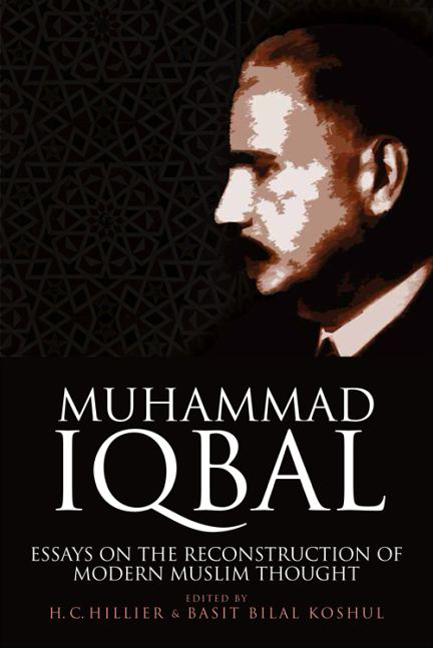Book contents
- Frontmatter
- Contents
- Preface
- 1 Introduction
- 2 The Human Person in Iqbal's Thought
- 3 Achieving Humanity: Convergence between Henri Bergson and Muhammad Iqbal
- 4 The Contemporary Relevance of Muhammad Iqbal
- 5 Pragmatism and Islam in Peirce and Iqbal: The Metaphysics of Emergent Mind
- 6 Between Hegel and Rumi: Iqbal's Contrapuntal Encounters with the Islamic Philosophical Traditions
- 7 Reconstructing Islam in a Post-metaphysical Age: Muhammad Iqbal's Interpretation of Immortality
- 8 Iqbal, Bergson and the Reconstruction of the Divine Nexus in Political Thought
- 9 Muhammad Iqbal: Restoring Muslim Dignity through Poetry, Philosophy and Religious Political Action
- Index
Preface
Published online by Cambridge University Press: 10 October 2017
- Frontmatter
- Contents
- Preface
- 1 Introduction
- 2 The Human Person in Iqbal's Thought
- 3 Achieving Humanity: Convergence between Henri Bergson and Muhammad Iqbal
- 4 The Contemporary Relevance of Muhammad Iqbal
- 5 Pragmatism and Islam in Peirce and Iqbal: The Metaphysics of Emergent Mind
- 6 Between Hegel and Rumi: Iqbal's Contrapuntal Encounters with the Islamic Philosophical Traditions
- 7 Reconstructing Islam in a Post-metaphysical Age: Muhammad Iqbal's Interpretation of Immortality
- 8 Iqbal, Bergson and the Reconstruction of the Divine Nexus in Political Thought
- 9 Muhammad Iqbal: Restoring Muslim Dignity through Poetry, Philosophy and Religious Political Action
- Index
Summary
There are few moments in human history where the forces of religion, culture, and politics converge to produce some of the most significant ideas and movements in the world. India in the early twentieth century was one of these moments, where the rise of activist-thinkers like Nehru, Jinnah, and Gandhi not only liberated human lives but their minds as well. Among them was the poet, philosopher, and politician Sir Muhammad Iqbal (widely known as Allama Iqbal) (1877–1938). He is widely considered one of the most original and influential Muslim thinkers of modern times. Standing between multiple worlds – the worlds of British colonialism and post-colonial India, the worlds of Islamic and European civilisations, and the worlds of tradition and modernity (among others) – Iqbal aspired to build bridges where others only saw divides and thereby transform the way that we know our world and the manner in which we act in it.
Commonly known as the ‘spiritual father of Pakistan’, the philosophical and political ideas of Iqbal not only shaped the face of Indo-Pakistani Muslim nationalism, but also the direction of modernist reformist Islam around the world. As a subject under the colonial British Raj, the immediate threat perceived by Iqbal was not merely religious but also intellectual and sociopolitical. While Muslims and Hindus under the British Raj had some religious freedom, politically they were still a largely marginalised and disempowered population who were denied full civil participation. From this context, Iqbal understood his project as contributing to a wider political debate on the place of the religious person in the modern political world. In order to advocate his cause and resolve the worldview crisis of modernised sociopolitical and philosophical thought, Iqbal undertakes the enormous task of the ‘reconstruction of religious thought in Islam’. To begin with, he finds warrants for this project in the history of the tradition he is reconstructing. Beginning with this warrant he goes on to combine the resources already present in this tradition with developments in Western philosophy and science in order to present a view of a historic religion. His reconstructed vision of Islam makes Islam not only consistent and relevant to the modern world but also shows that Islam can make a uniquely valuable contribution to the culture of the global village.
- Type
- Chapter
- Information
- Muhammad IqbalEssays on the Reconstruction of Modern Muslim Thought, pp. vii - xiiPublisher: Edinburgh University PressPrint publication year: 2015



